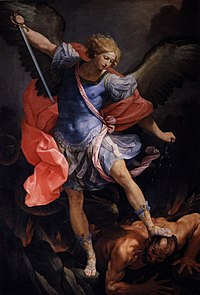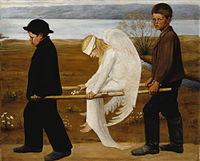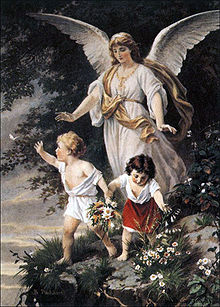Angel
Not to be confused with Angle.
An angel is a supernatural spiritual being who, according to various religions, is God's servant.
Abrahamic religions often depict angels as benevolent celestial intermediaries between God (or Heaven) and humanity.[1][2] Other roles include protectors and guides for humans, and servants of God.[3] Abrahamic religions describe angelic hierarchies, which vary by religion and sect. Some angels have specific names (such as Gabriel or Michael) or titles (such as seraph or archangel). Those expelled from Heaven are called fallen angels, distinct from the heavenly host.
Angels in art are usually shaped like humans of extraordinary beauty.[4] They are often identified in Christian artwork with bird wings,[5] halos,[6] and divine light.
The word angel arrives in modern English from Old English engel (with a hard g) and the Old French angele.[7] Both of these derive from Late Latin angelus, which in turn was borrowed from Late Greek ἄγγελος angelos (literally "messenger").[8] Τhe word's earliest form is Mycenaean a-ke-ro, attested in Linear B syllabic script.[9] According to the Dutch linguist R. S. P. Beekes, ángelos itself may be "an Oriental loan, like ἄγγαρος (ángaros, 'Persian mounted courier')."[10]
The rendering of "ángelos" is the Septuagint's default translation of the Biblical Hebrew term malʼākh, denoting simply "messenger" without connoting its nature. In the Latin Vulgate, this meaning becomes bifurcated: when malʼākh or ángelos is supposed to denote a human messenger, words like nuntius or legatus are applied. If the word refers to some supernatural being, the word angelus appears. Such differentiation has been taken over by later vernacular translations of the Bible, early Christian and Jewish exegetes and eventually modern scholars.[11]
In Zoroastrianism there are different angel-like figures. For example, each person has one guardian angel, called Fravashi. They patronize human beings and other creatures, and also manifest God's energy. The Amesha Spentas have often been regarded as angels, although there is no direct reference to them conveying messages,[12] but are rather emanations of Ahura Mazda ("Wise Lord", God); they initially appeared in an abstract fashion and then later became personalized, associated with various aspects of creation.[13]
Judaism[edit]
In Judaism, angels (Hebrew: מַלְאָךְ mal’āḵ; "messenger"), are understood through interpretation of the Tanakh and in a long tradition as supernatural beings who stand by God in heaven, but are strictly to be distinguished from God (YHWH) and are subordinate to him. Occasionally, they can show selected people God's will and instructions.[14] In the Jewish tradition they are also inferior to humans since they have no will of their own and are able to carry out only one divine command.[15]
Hebrew Bible[edit]
The Torah uses the Hebrew terms מלאך אלהים (mal'āk̠ 'ĕlōhîm; "messenger of God"), מלאך יהוה (mal'āk̠ Yahweh; "messenger of the Lord"), בני אלהים (bənē 'ĕlōhîm; "sons of God") and הקודשים (haqqôd̠əšîm; "the holy ones") to refer to beings traditionally interpreted as angels. Later texts use other terms, such as העליונים (hā'elyônîm; "the upper ones").[citation needed]
The term 'מלאך' ('mal'āk̠') is also used in other books of the Hebrew Bible. Depending on the context, the Hebrew word may refer to a human messenger or to a supernatural messenger. A human messenger might be a prophet or priest, such as Malachi, "my messenger"; the Greek superscription in the Septuagint translation states the Book of Malachi was written "by the hand of his messenger" ἀγγέλου (angélu). Examples of a supernatural messenger[16] are the "Malak YHWH," who is either a messenger from God,[17] an aspect of God (such as the logos),[18] or God himself as the messenger (the "theophanic angel.")[16][19]
Michael D. Coogan notes that it is only in the late books that the terms "come to mean the benevolent semi-divine beings familiar from later mythology and art."[20] Daniel is the biblical book to refer to individual angels by name,[21] mentioning Gabriel in Daniel 9:21 and Michael in Daniel 10:13. These angels are part of Daniel's apocalyptic visions and are an important part of apocalyptic literature.[20][22]
In Daniel 7, Daniel receives a dream-vision from God. [...] As Daniel watches, the Ancient of Days takes his seat on the throne of heaven and sits in judgement in the midst of the heavenly court [...] an [angel] like a son of man approaches the Ancient One in the clouds of heaven and is given everlasting kingship.[23]
Coogan explains the development of this concept of angels: "In the postexilic period, with the development of explicit monotheism, these divine beings—the 'sons of God' who were members of the Divine Council—were in effect demoted to what are now known as 'angels', understood as beings created by God, but immortal and thus superior to humans."[20] This conception of angels is best understood in contrast to demons and is often thought to be "influenced by the ancient Persian religious tradition of Zoroastrianism, which viewed the world as a battleground between forces of good and forces of evil, between light and darkness."[20] One of these is hāššāṭān, a figure depicted in (among other places) the Book of Job.
Rabbinic Judaism[edit]
According to Rabbinic Judaism, the angels have no bodies, but are eternally living creatures created out of fire. The Babylonian Talmud reads as "The Torah was not given to ministering angels." (לא נתנה תורה למלאכי השרת) usually understood as a concession to human's imperfection, in contrast to the angels.[24] Thus, they occasionally appear in Midrashim as competition with humans.[25] The angels as heavenly beings, strictly following the laws of God, become jealous of God's affection for man. Humans, by following the Torah, in prayer, by resisting evil instincts (yetzer hara) and by teshuva, are preferred to the flawless angels. As a result, they are also inferior to humans in the Jewish tradition. In the Midrash, the plural of El (Elohim) used in Genesis in relation to the creation of human beings is explained by the presence of angels: God therefore consulted with the angels, but made the final decision alone. This story serves as an example, teaching that the powerful should also consult with the weak. God's own final decision highlights God's undisputable omnipotence.[25]
In post-Biblical Judaism,[clarification needed] certain angels took on particular significance and developed unique personalities and roles. Although these archangels were believed to rank among the heavenly host, no systematic hierarchy ever developed. Metatron is considered one of the highest of the angels in Merkabah and Kabbalah mysticism and often serves as a scribe; he is briefly mentioned in the Talmud[26] and figures prominently in Merkabah mystical texts. Michael, who serves as a warrior[27] and advocate for Israel,(Daniel 10:13) is looked upon particularly fondly.[28] Gabriel is mentioned in the Book of Daniel (Daniel 8:15–17) and briefly in the Talmud,[29] as well as in many Merkabah mystical texts. There is no evidence in Judaism for the worship of angels, but there is evidence for the invocation and sometimes even conjuration of angels.[21]
Philo of Alexandria identifies the angel with the Logos inasmuch as the angel is the immaterial voice of God. The angel is something different from God himself, but is conceived as God's instrument.[30]





